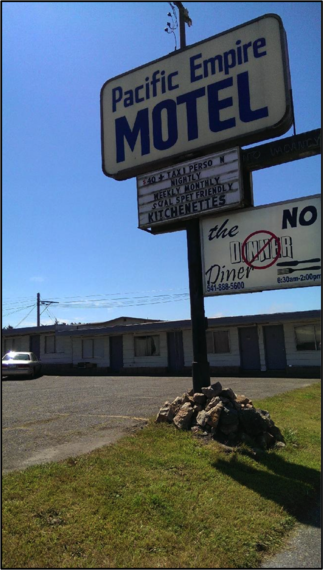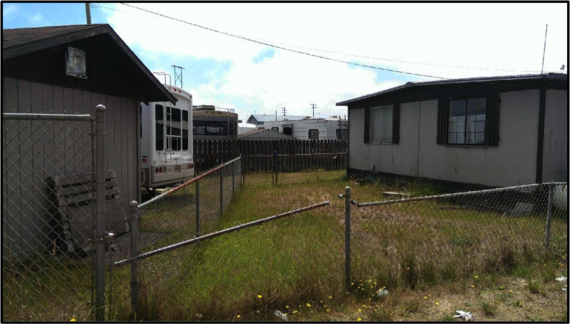Like the faces of the children it serves, the summer food program is a hopeful thing. It is a shining example of a community coming together in formal and informal ways to ensure that no child goes hungry. This is remarkably evident at the Bay Way Mobile Park in Coos Bay, Oregon.
I've come to Coos Bay to ride-along on a rural summer meals distribution route with Coos Bay School District. The school district received a $5000 grant from Partners for a Hunger-Free Oregon to expand access to summer meals. The school district used the award to help purchase a small panel truck so they could serve hot meals to the children who live in the pockets of the town where no school or park -- the traditional serving spots for the Summer Food Service Program -- is within walking distance.
Susan Kessell, who manages the park, tells me she does it for the kids. "Right now, it's the end of the month and the SNAP is all gone, so they are coming out in droves," she says while holding a sleeping infant.
The atmosphere at this site is familial and social. Mothers sit with their kids. Susan tells the children they can take a book when they finish their sandwich, and the children eat. "I love having the lunches here. Diane from the school district came by and asked if I wanted to have someone come here with the lunches and I said: Oh God yes!" The meals are served right outside Susan's mobile home.
The school district supplied them with a second picnic table to provide enough seating for all the kids. I asked her if the table made a difference. She added, "Sure, but they're kids, they will eat wherever there is food!"
This drive around Coos Bay has shown how the summer food program can help families and communities keep their kids fed and healthy during the summer break. It has also shown me a devastating view of the poverty that is pressing down on too many Oregonians and their children.
Our last two stops of the day were at The Empire Motel, a weekly stay motel and another R.V. park just over the bridge in Charleston. Luke warned me at the beginning of this trip that these were desperate places. He said, "If we didn't bring this food, I know these kids wouldn't eat."
A family with two kids sat in their red Jeep as we pulled up. They were waiting so their kids could get a lunch before leaving to visit to their grandmother who was in the hospital. The kids rushed over. Luke had saved some activity books for them, as he knew they had been spending some time there. He pulled the books out first, even before the lunch.
They were ecstatic in the way that kids get when a promise is delivered on. Just then, two girls, a teen and her younger sister both with age-appropriate black hoodies, slipped out of one of the far doors and crunched the parking lot gravel as they crossed. They waited silently for their lunches. I asked, "How many days do you come to eat lunch?"
"Every day we're here," the older one said. "Most of the time," said the little one.
They took their pizza and sat on the edge of what were functionally planter boxes that ran under the window of each unit. None of them had flowers, so they now served as outdoor seating for the motel residents. The desk clerk came out to ask Luke how long the lunches would be going on. Luke told her that they serve until August 15th.
She thought they might have more kids next week. They had just lost several families with kids. She told me most could no longer pay the rent and had to leave, but one family got an apartment.
"Most of these families just lost their house and they come here because of their kids. They stay here as long as they can, but the $40 adds up," she said.
As we cross the bridge over into Charleston, it is more obvious that we are by the sea. The wind is strong and cold. It smells salty and like the sea. Luke points out a mountain of oyster shells that is taller than the building that holds the business that shucks them.
The R.V. park was in a dirt lot where pop-up campers and mobile homes sat in sparse lines along the two-track dirt road that ran in and out, patchy grass popping up in places.
We drove past and served lunch in a gravel lot next to the church garage. Not very inviting, but according to Luke it is safer than in the R.V. park.
The kids arrived by hopping the broken fence that separated the church property from the R.V. park as. The bigger kids helped some little kids over. Luke served the last of the meals we had to the four little kids on bikes and three homeless teens.
The teens lived in lean-to style tarp tents on the edge of the property. One had dreadlocks, and one a dog. They said they ate here everyday if there were enough meals. I could tell they were more interested in eating than in talking. Luke said yesterday he ran out of meals, so he gave them the remaining apple and a couple of extra milks. As we drove out of the church, a police car pulled into the R.V. park.
When Luke and I returned to the administration building Diane asked me if I had fun. I jokingly assured her that road trips weren't my thing. My stomach and voice were tight as I relayed what I saw from the truck - families, children and real lives.
On my way back north toward Portland, I didn't notice much as I drove and I didn't stop until Eugene. My mind was stuck on each stop during the two and a half hour drive I took in Coos Bay.

